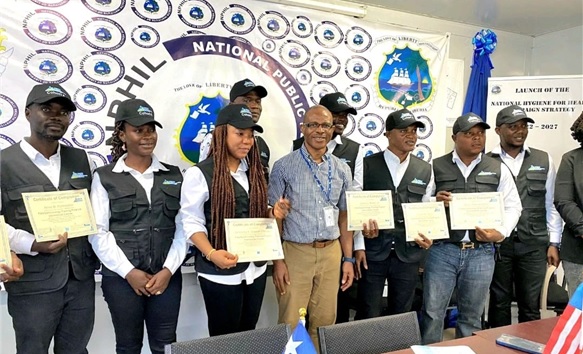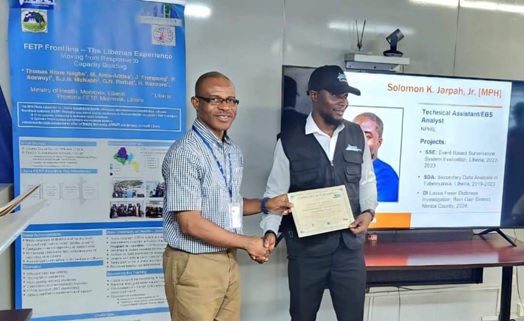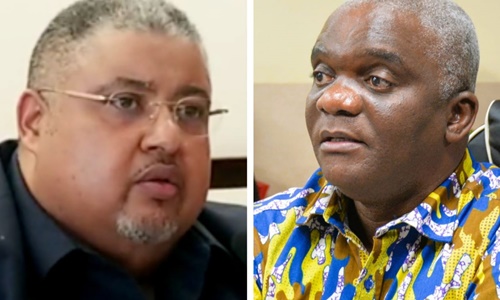MONROVIA – Liberia’s commitment to public health continues to deepen under the leadership of Dr. Dougbeh Chris Nyan, Director-General of the National Public Health Institute of Liberia (NPHIL). As the country remains vigilant in the face of potential health threats, NPHIL’s strategic planning and capacity-building efforts have kept Liberia ahead of the curve in managing outbreaks. Over the weekend, these efforts culminated in the graduation of nine individuals from NPHIL’s intensive Epidemiology Training Program, enhancing the nation’s ability to respond swiftly and effectively to health crises.
The training, held at NPHIL’s headquarters in Monrovia, equipped participants with advanced skills in epidemiology—the study of how diseases spread, their causes, and the strategies for prevention. As Liberia works to bolster its public health infrastructure, epidemiologists are at the forefront, gathering and analyzing critical data to identify risk factors, track disease outbreaks, and improve policy and intervention strategies.

At the graduation ceremony, Dr. Nyan praised the graduates of the Liberia Field Epidemiology Training Program (LFETP), thanking the U.S. Centers for Disease Control and Prevention (US-CDC) and the African Field Epidemiology Network (AFENET) for their support. “An addition of more disease detectives enhances NPHIL’s capacity for disease surveillance, response, and management,” said Dr. Nyan. “A big thank-you to the US-CDC and AFENET for facilitating and sponsoring this essential training over the years.”
The ceremony drew praise on social media, with well-wishers from across the public health community celebrating the graduates. Henry Foday-Musa, Jr., one of the commenters, lauded the new cohort, saying, “Congratulations to all graduates for your willingness to keep learning new skills. Special thanks to NPHIL and its partner organizations for ensuring that more disease detectives are trained. Kudos!” Another commenter, Joel Russell, expressed hope to join future sessions, emphasizing the value of learning from the best in the field.
Olayinka Stephen Ilesanmi, also sharing his thoughts, urged the graduates to remain proactive in applying their new skills. “Now that you’ve completed your training, it’s important to continuously apply and expand upon the knowledge you’ve gained. Keep pushing boundaries, engage in innovative research, and contribute to real-world solutions.”

The completion of this epidemiology training follows closely on the heels of a one-week emergency management program, which included NPHIL staff and military field epidemiologists representing all 15 counties of Liberia. Held on September 13, 2024, this training, organized in partnership with the Africa Centres for Disease Control and Prevention (Africa CDC), focused on strengthening Liberia’s preparedness to respond to outbreaks such as MPOX. Dr. Nyan described the training as “an essential component of our preparedness efforts.”
Liberia’s battle against infectious diseases, including MPOX, Lassa fever, and measles, continues with strong support from both local and international partners. Dr. Nyan expressed his deep gratitude for their contributions, particularly in facilitating Incident Management System (IMS) meetings at NPHIL, which have been crucial in shaping the country’s outbreak response strategy.
“The NPHIL is exceedingly grateful to all partner institutions and counties for their unwavering support,” Dr. Nyan said. “Their contributions in resources and strategic planning have been instrumental in strengthening Liberia’s public health defenses.”
With the recent budgetary allocation by the Liberian government for outbreak response, including the fight against MPOX, Dr. Nyan remains optimistic about Liberia’s capacity to manage future public health threats. He stressed that ongoing collaboration and the sharing of resources will be key to sustaining the nation’s readiness.
As Liberia trains more epidemiologists, the country’s resilience against outbreaks grows stronger, underlining the importance of continuous learning and strategic partnerships in safeguarding public health.







